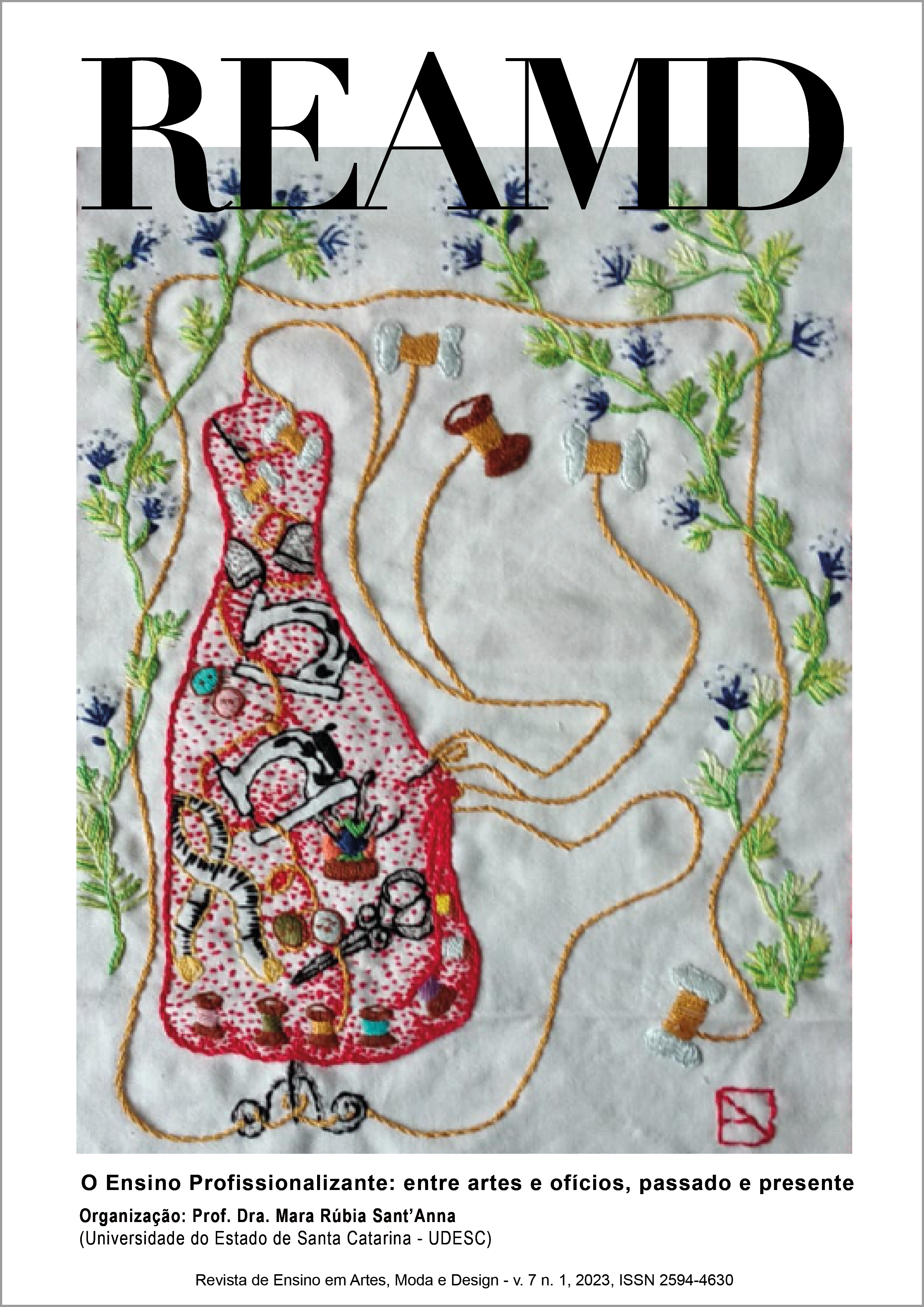Liceu de Artes e Ofícios da Bahia: from crafts to citizen education through art
DOI:
https://doi.org/10.5965/25944630712023e2874Keywords:
Arts and Crafts, Education, CitizenAbstract
This article is the result of the strand of Bahia of the inter-institutional research Schools of Arts and Crafts in Brazil: history, training proposals and continuities in the formation of the Bachelor of Fashion Design. Of a qualitative nature, the research prioritizes a historical investigation, analyzing the Liceu de Artes e Ofícios da Bahia (1872-2007), its beginnings and development, searching for clothing activities, such as cutting and sewing. We try to understand the role of the institution in the formation of citizens, especially from the social conjuncture that existed at the time of its emergence, of a population recently freed from slavery in a city in the process of industrialization. In addition, it seeks to understand what role the Liceu plays in soteropolitan society, especially in the 1990s and 2000s, inquiring if it had as direction the teaching of cloth modeling and sewing. Methodologically, we used as main resource the bibliographic research, gathering information about the institution and the socio-educational context of Bahia through the works of Cunha (1979), Leal (1996), Trinchão (2008) and Reis (2012), with support in a questionnaire with some professionals who worked at the institution in the most recent period. It is concluded that the Liceu de Artes e Ofícios da Bahia perpetuated its main objective of assisting and instructing economically disadvantaged classes. There was no further development of activities related to clothing practices, of which only traces were found. In its last years, the Liceu promoted citizen education through the arts.
Downloads
References
ALCÂNTARA, Paulo Henrique de. Liceu de Artes e Ofícios da Bahia. Questionário respondido e enviado a Renata Pitombo Cidreira. Salvador, 30 de julho de 2021.
ANDRADE, Mario de. O artista e o artesão. Aula inaugural dos cursos de Filosofia e História da Arte, do Instituto de Artes, Universidade do Distrito Federal, 1938.
CUNHA, Luiz Antônio. O ensino de ofícios manufatureiros em arsenais, asilos e liceus. Revista Fórum Educacional. Rio de Janeiro, v. 3, n. 3, p. 3-47, jul./set. 1979.
LICEU de Artes e Ofícios da Bahia. In: Enciclopédia Itaú Cultural de Arte e Cultura Brasileira. São Paulo: Itaú Cultural, 2018. Disponível em: http://enciclopedia.itaucultural.org.br/instituicao17451/liceu-de-artes-e-oficios-da-bahia. Acesso em: 08 de abril de 2022. Verbete da Enciclopédia. ISBN: 978-85-7979-060-7.
LEAL, Maria das Graças de Andrade. A arte de ter um ofício (1872-1996): Liceu de Artes e Ofícios da Bahia. Salvador: Liceu de Artes e Ofícios da Bahia, 1996, 402p.
LEAL, Maria das Graças de Andrade. Informação verbal concedida a Renata Pitombo Cidreira e Renata Costa Leahy, via plataforma de videoconferência Jitsi. Salvador, 26 de agosto de 2021.
PASSOS, Edvard. Liceu de Artes e Ofícios da Bahia. Questionário respondido e enviado a Renata Costa Leahy. Salvador, 12 de abril de 2021.
REIS, Lysie. A liberdade que veio do ofício: práticas sociais e cultura dos artífices na Bahia do século XIX. Salvador: EDUFBA, 2012.
SCALDAFERRI, Danilo. Liceu de Artes e Ofícios da Bahia. Questionário respondido e enviado a Renata Pitombo Cidreira. Salvador, 04 de abril de 2021.
SUASSUNA, Ariano. Iniciação à estética [recurso eletrônico]. 1. ed. Rio de Janeiro: José Olympio, 2013.
TRINCHÃO, Gláucia Maria Costa. O desenho como objeto de ensino: História de uma disciplina a partir dos livros didáticos luso-brasileiros oitocentistas. Tese (doutorado em educação). Programa de Pós-Graduação em Educação, Universidade Vale do Rio dos Sinos. São Leopoldo - RS, 2008.
Published
How to Cite
Issue
Section
License
Copyright (c) 2022 Renata Pitombo Cidreira, Renata Costa Leahy

This work is licensed under a Creative Commons Attribution 4.0 International License.
- Authors retain copyright and grant the journal the right of first publication, with work simultaneously licensed under the Creative Commons Attribution 4.0 International License, which allows for:
1. Share — copy and redistribute the material in any medium or format for any purpose, even commercially.
2. Adapt — remix, transform, and build upon the material for any purpose, even commercially.
The licensor cannot revoke these freedoms as long as you follow the license terms.Under the following terms:
1. Attribution — You must give appropriate credit, provide a link to the license, and indicate if changes were made. You may do so in any reasonable manner, but not in any way that suggests the licensor endorses you or your use.
2. No additional restrictions — You may not apply legal terms or technological measures that legally restrict others from doing anything the license permits. -
Plagiarism, in all its forms, constitutes unethical publication behavior and is unacceptable. This magazine uses iThenticate similarity control software.






